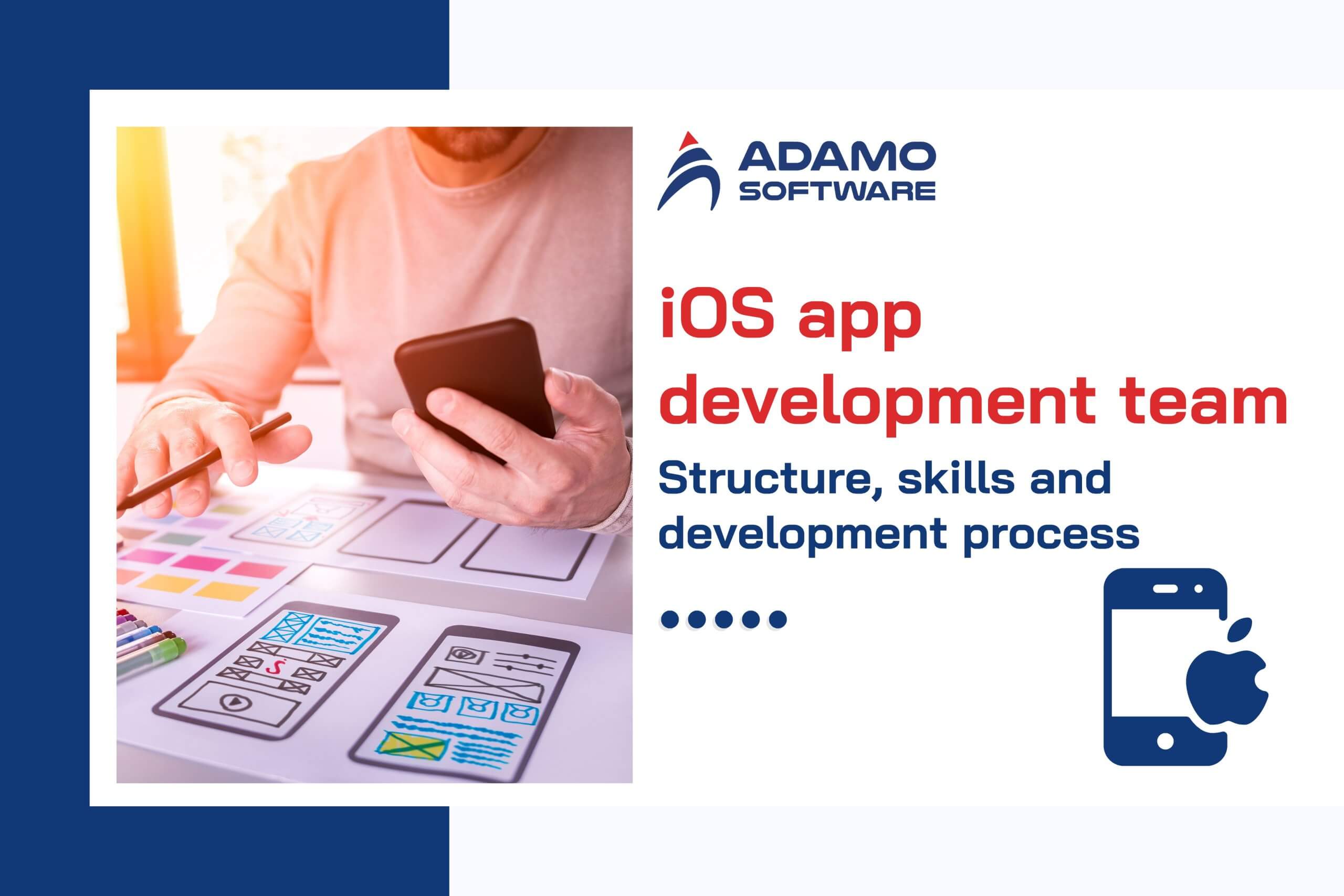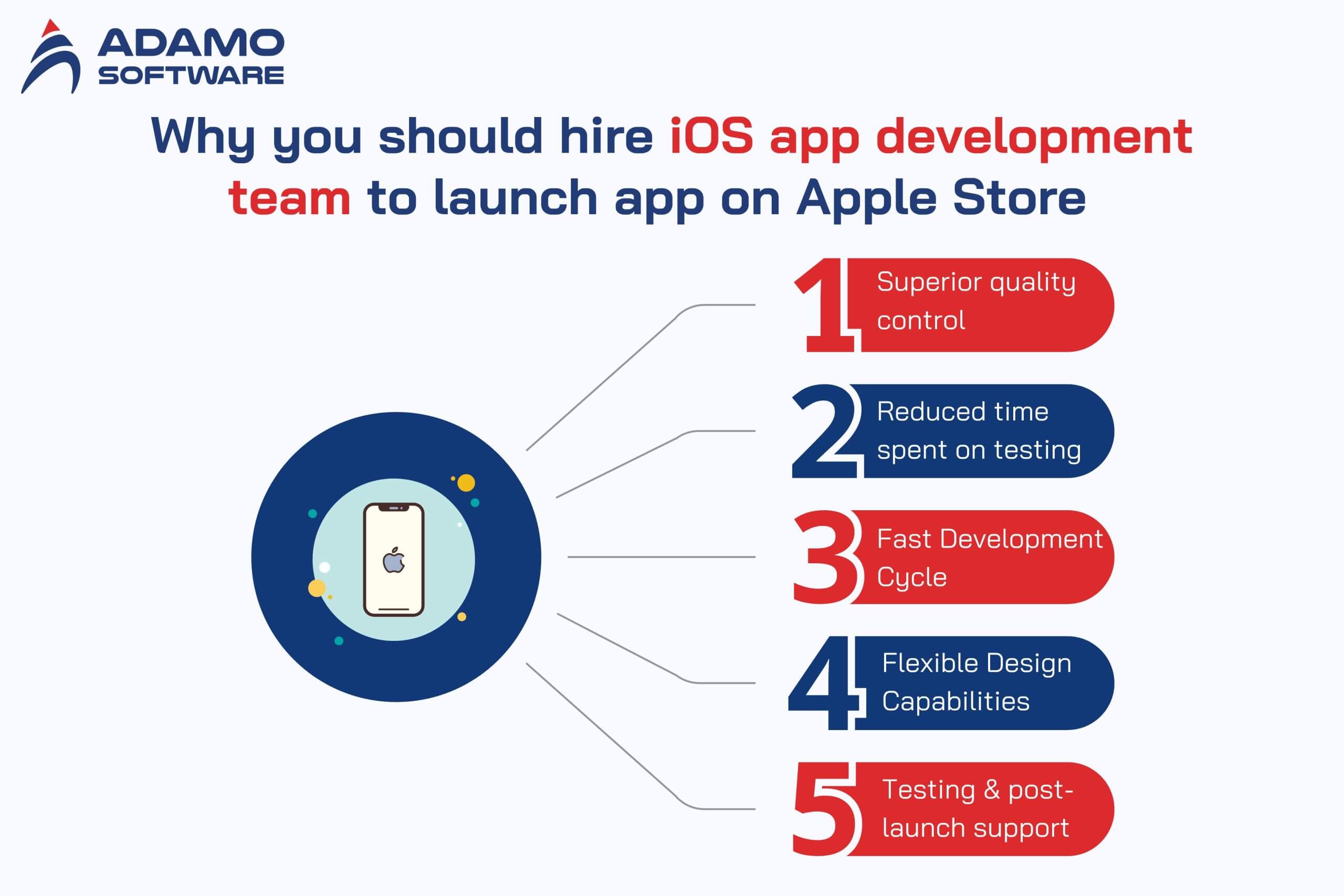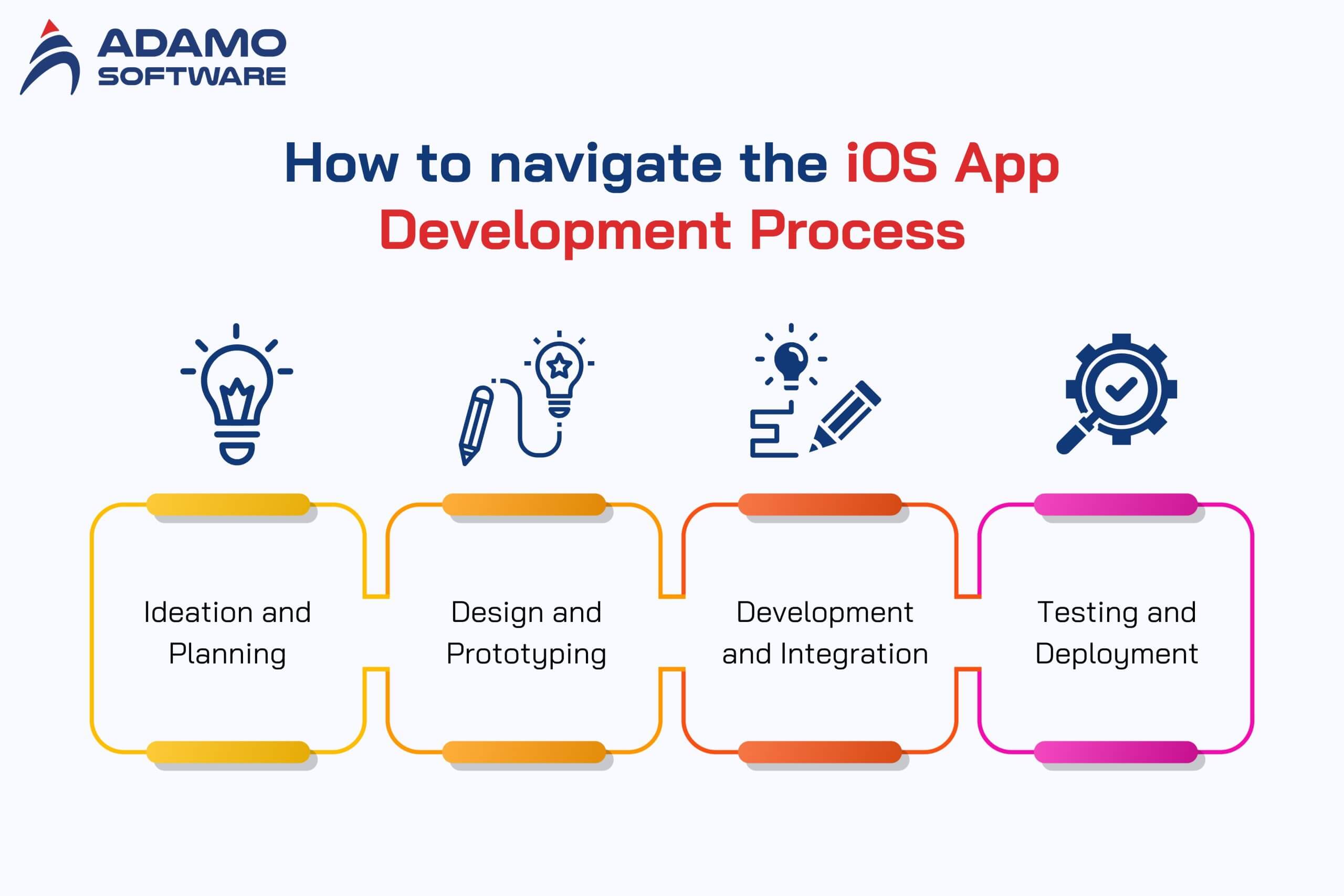IOS app development team: Structure, skills and development process

Creating outstanding iOS apps is more than just code; it’s about collaboration and team roles. At the core of every successful iOS app project is an optimized team where project managers, developers, UI/UX designers, quality assurance engineers, and business analysts coordinate their efforts. This ensures a seamless app development process supported by team collaboration and technology project management.
When diving into the key elements of an iOS app development team, we’ll break down the essentials of mobile app design, software testing, and strategies for success in the app market. Every team member plays a crucial role in creating a seamless and engaging user experience that aligns with market demands.
I. Why you should hire iOS app development team to launch app on Apple Store
Android is technically the most popular mobile platform on the market. But there are many reasons why launching an iOS app can give your business a competitive edge, as well as outsourcing to an iPhone app development company. Here are just a few great reasons:

1. Superior quality control
Apple provides everything you need to build an iOS app. This means that all the tools, libraries, and components will meet the highest quality standards without relying on third-party support. This way, no matter what features you want to include in your iOS app, you can be confident that it will work as expected on all compatible iOS devices.
2. Reduced Time Spent on Testing
You only need to test your app on a small number of select iOS devices (as opposed to a much larger pool of compatible Android devices). This significantly reduces the time, money, and resources needed to test your app.
3. Fast Development Cycle
Developing an iOS app from scratch or updating an existing iOS app is relatively fast. Because all the tools, libraries, and components needed to build your app are readily available. And you only need to ensure the app works on a few devices. As a result, your Apple iOS app development team will get your product to market sooner, giving you a competitive edge.
4. Flexible Design Capabilities
Whether you want to build a mobile game, a business app, or a social media platform on iOS, the Xcode framework is flexible enough to support your digital dreams with the utmost ease. You will be impressed with the flexibility of Xcode and your creativity with your app ideas. And the best part? The iOS app development team will bring all their knowledge and skills to achieve the best results.
5. Testing and post-launch support
With TestFlight, a cloud-based testing platform, you can efficiently test your iOS app across various devices and user groups without investing in physical hardware. At Adamo Software, we support you at every stage of the testing process. Helping to detect and resolve potential issues before your app goes live. Additionally, we provide post-launch support to keep your app running smoothly, reliably, and up to date.
II. IOS app development team structure: Main roles
1. Project manager / product manager
A project manager is responsible for a project from start to finish. However, product management is often confused as a synonym for project management. Although both these professionals are managers, they have different responsibilities and perform different tasks. The difference lies in what each one manages. A project is a temporary endeavor with a well-defined plan, a set start date, and a clear end date. Furthermore, a product needs to create ongoing value for users and has no time limit.
Project managers focus primarily on the performance of the application development process. They adhere to deadlines and quality standards based on the vision of the product manager.
Responsibilities of a project manager include:
- Assigning tasks to the development team, setting terms for sprints, and prioritizing tasks
- Estimating project costs and staying within your budget
- Building communication between you as the client and the developer as the contractor
- Accommodating changes to the app development plan
- Maintaining quality, meeting deadlines, and keeping costs from spiraling out of control
Therefore, they must possess the following soft and hard skills:
- Leadership, communication, critical thinking, time management, teamwork, creativity, and diplomacy.
- Familiarity with different project management methodologies such as Waterfall and Agile with Scrum or Kanban framework.
- Strong experience using project management tools such as TeamGantt, Asana, and Confluence.
A product manager is responsible for determining the viability of an app idea by doing tasks such as: gathering data on the competition, technical specifications, and benefits of a new app that can be used to develop that app effectively. A product manager is a strategist who:
- Analyzes the market, identifies the core benefits, value, and features of the app; and examines your target users
- Identify key user problems and come up with optimal solutions
- Create a business plan for app development
- Prioritize valuable app features
- Extract a unique value proposition and help you formulate a strong call to action
A product manager should have the same soft and hard skills as a project manager and have extensive experience using analytics tools like Firebase, Google Analytics, Mixpanel, and App Annie.
In some cases, the responsibilities of these two professionals are combined and performed by one person with the title of project manager. However, if a project is complex and large in scope, it may be more efficient to split the workload between a project manager and a product manager.
2. UI/UX designer
The main task of a UI/UX designer is to provide a good user experience by providing user-friendly, intuitive, interesting and attractive application design.
UI/UX Designers are responsible for:
- Create authentic user experiences
- Think about user flows and outline the application framework
- Create visual app prototypes
- Build intuitive application interfaces
- Make changes according to user feedback and test data
To fulfill these responsibilities, you will have to hire a UI/UX designer with the following skills:
- Expertise in working with UI/UX design tools such as Figma, InVision and Sketch
- Up-to-date knowledge of UX research, wireframes, UI prototyping, and interaction design
- Have some understanding of coding to be on the same page as programmers
3. iOS developers
iOS and Android use different programming languages and have different requirements. That’s why you need a separate iOS app development team for each platform. However, whether you build apps for one platform, or both, depends on your target audience and budget.
In general, an iOS app development team handles the technical aspects of creating a mobile app.
- Turn sketches, mockups, and wireframes into high-quality code
- Create and maintain reusable, reliable, and high-performance code
- Deliver mobile apps with the best quality, performance, and responsiveness
- Fix app bugs and other errors
- Stay up to date with new technology trends
To make the hiring process easier, let’s dive deeper into the skills that a high-level iOS developer should have:
– Required skills for an iOS developer:
- Expertise in Objective-C and Swift for developing native apps
- Proficiency in Xcode IDE, the primary development platform for macOS, iOS, and iPadOS applications.
- Grasp how to build apps for the most recent generations of iOS and iPadOS
4. Backend developer
The backend developer manages server working, cloud storage, and operational logic.
Backend developers are responsible for:
- Storing data, securing data, and presenting data to the right users
- Managing accessible payment systems and securely storing data to enable users to make in-app purchases
- Using application programming interfaces (APIs) across multiple devices
- Building operational logic across multiple devices
- Building application frameworks and architectures
- Working with databases, integrated development environments (IDEs), and collaboration services
To manage all these tasks, a highly experienced and skilled backend developer must have:
- Hands-on experience with programming languages such as Java, .Net, Python, PHP, or Ruby
- Experience with version control tools such as Git
5. QA Tester
The primary responsibility of a quality assurance (QA) engineer is to oversee every stage of mobile application development to ensure that the mobile design and software comply with all requirements. The role of a QA engineer in the application development process cannot be underestimated. Because timely detection of application errors and bugs helps you meet project release deadlines and stay within budget.
Common tasks of a QA engineer:
- Perform automated and manual testing
- Record testing progress and document test cases
- Track errors throughout the testing process
- Identify potential challenges that users may encounter during use
- Develop rigorous testing standards to determine application quality and release readiness
What skills does a highly skilled QA professional need besides soft skills like teamwork?
- Extensive experience using QA testing tools like TestComplete, Robotium, and Appium
- Familiarity with feature and bug tracking tools like Jira
III. Tips to choose the right size for App Development Team on iOS
Now that you understand the structure of an iOS app development team, how do you choose the right team size? A typical project requires an average of 5 to 10 roles. So, filling these roles depends on several factors, such as:
1. Project Size
The size of the project will determine how long it will take to complete. A larger, time-sensitive project will require hiring as many people as possible to build it faster. For example, you may need to hire two backend developers to share the workload and reduce the time it takes to get your mobile app to market.
2. Project Complexity
The size of the mobile app development team structure required to build a complex app is much larger than that of a simple app. For simple to medium apps, some developer roles may cover a variety of functions. However, for a complex app, you may need to hire specialist developers with years of experience for specific functions to ensure that they program high-tech features.
3. Budget
The budget for iOS app development is a major deciding factor in setting up an iOS app development team. The budget determines the allocation of human resources. It also directly impacts the number of experts that can be hired for the iOS app development team. The cost of developing an iOS app depends on several factors, including the app’s complexity, the required features, and the iOS app development team you choose, especially their location.
While creating an in-house team can provide complete control over the project, it often comes with high overhead costs. On the other hand, outsourcing your iOS app development can provide a more immediate and cost-effective solution. You can also find highly skilled development teams without the overhead costs of hiring and building a team.
4. Do You Have an In-House IT Department?
You may not be able to have a larger iOS app development team if you already have an internal department for smartphone products. Because this changes your outsourcing needs. For example, your project may only require outsourcing some parts, such as manual and automated testing.
Read more: Hire app development team: What to expect in IT outsourcing
IV. How to navigate the iOS App Development Process
The process of developing a mobile app for iOS is a carefully planned journey, where every stage plays a vital role in the overall success of the app. These stages include:
The iOS app development process is a carefully structured journey. Each stage plays an important role in the entire app development process. These stages include:

1. Ideation and Planning
The ideation and planning stage forms the backbone of the entire development process. During this stage, team members must define the goals, values, and features of the app. They must also analyze competitors and identify the target audience to guide the entire development process. Comprehensive market research is crucial to gain insights into competitors, market demand, popular features, and user expectations. This helps you craft a strategic plan and uncover opportunities to make your app unique.
Idea validation also ensures that the app solves a real problem or need before the iOS app development team commits to full development. This is achieved by:
- Creating a mid-fidelity prototype to visualize the app’s user experience and flow
- Evaluating the app’s relevance and reviewing early user experiences
- Refining and aligning the app concept with user needs and the company’s vision.
This process lays the foundation for the next stages of the development process.
2. Design and Prototyping
iOS apps begin to take shape during the Design and Prototyping phase. During this step, UI/UX designers focus on understanding user behavior, preferences, and pain points during the design process. They are also responsible for creating wireframes, selecting color palettes, and typography to ensure the app is user-friendly.
High-fidelity interactive prototypes are built that allow testers to provide feedback on the app’s usability and convenience before the final development begins. This phase ensures that the design of the iOS app matches user expectations and provides a seamless and engaging user experience.
3. Development and Integration
During this development and integration phase, the iOS app comes to life. Backend developers focus on server-side logic, database management, API integration, and security measures, as well as optimizing the integration of multiple third-party services. On the other hand, front-end developers are responsible for building the user interface and creating visual components that the user interacts with. This creates a smooth experience by connecting these components with the backend services.
The development and integration phase also ensures that the architecture of the app is robust and that the app’s functionality is implemented efficiently. We integrate any needed third-party services and make sure the app’s performance is fully optimized. This lays the groundwork for the final stage of development.
4. Testing and Deployment
The Testing and Deployment phases are the final stages of the app development process. In this phase, crucial elements like performance, scalability, crash prevention, competitiveness, and stability are thoroughly tested. Performance testing is important as it helps you understand the responsiveness, speed, and behavior of your app under different workload conditions.
Before launching an iOS app, it is essential to ensure technical readiness by resolving any remaining bugs and fine-tuning the user experience. The app’s entry must be configured on iTunes Connect with a ‘pending upload’ status as part of the final preparations for deployment. The deployment process also includes Application Loader tests and Apple reviews, including both automated and manual reviews, before the app is available on the App Store.
V. Why chooses Adamo dedicated development team for your iOS app
At Adamo Software, we guide you through creating an iOS app that brings your ideas to life. From the initial planning stage to building and testing your app, we’ve got you covered. Our iOS app development team uses the latest tools and technologies like Swift and Objective-C. Plus, we customize every detail to fit your specific needs.

We know how important it is to deliver your app on time and within budget. That’s why we focus on efficiency and quality to meet your deadlines economically. Our job doesn’t end at launch; we offer continuous support to ensure your app runs smoothly and stays up to date. When you choose Adamo’s dedicated team, you’re not just getting developers; you’re getting a partner committed to helping you succeed every step of the way.
FAQs
1. Which programming language should I choose for my iOS app development project: Swift or Objective-C?
You should use Swift language for iOS mobile app development. Objective-C offers several benefits, but Swift is a more powerful and modern programming language. It provides great performance, security, and maintainability, which makes iOS developers highly productive.
2. I already have an Android app. Can I reuse any of that work?
You can reuse resources like requirements documents, technical solutions, specifications, test strategies, test plans, cloud storage, databases, database schemas, and APIs. However, you will need to code the iOS mobile app from scratch.
3. Is it advisable for iPhone app developers to use the Apple Core Foundation framework?
iOS mobile app developers should use the Core Foundation framework. It offers many advantages for developing native iOS apps. This framework allows you to access low-level functions and basic data types.
4. What does the iPhone app development process involve?
As one of the leading software development companies in Vietnam, we follow an agile approach that includes the following stages: project ideation and conceptualization, application architecture design, and development. We publish the application to the App Store, providing ongoing maintenance and support.
5. Why should you consider investing in iOS app development services?
iOS app development is one of the best ways to grow your business. Apple devices are always in sync, simplifying the development process without compatibility issues. The iOS mobile solutions that Adama iOS app development company provides can also be monetized quickly, giving businesses additional revenue opportunities.
6. How long does it take to develop an iOS app?
The time it takes to develop an iOS app depends on the complexity, features, design, integrations, testing requirements, maintenance, etc. of the app. Creating a simple app typically takes 3-4 months, whereas developing a more complex app can take anywhere from 6 to 12 months or longer.
7. Can I update my iOS app after launch?
Of course, you can update your iOS app after launch. Our iPhone app developers regularly release updates to fix bugs, introduce new features, and respond to user feedback.
8. How can businesses benefit from iOS app development services?
You can establish a strong online presence by leveraging Apple’s robust ecosystem and technological advancements. It also digitizes workflows and delivers superior user experiences.





